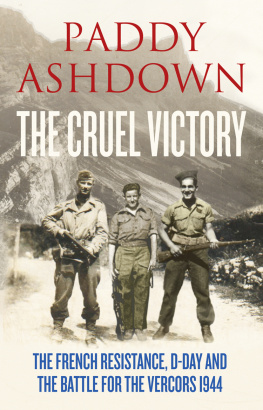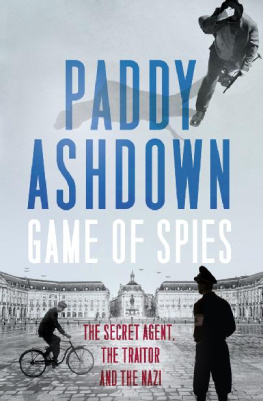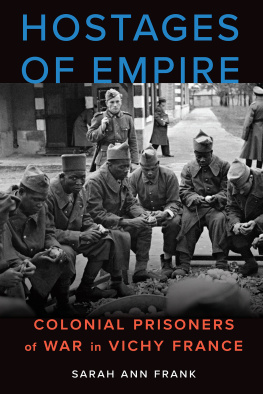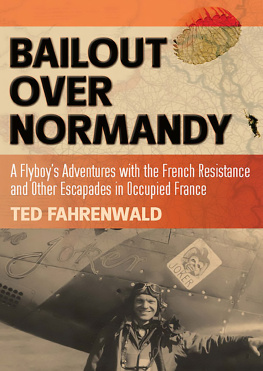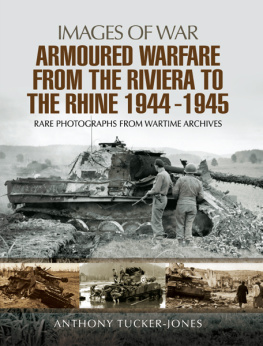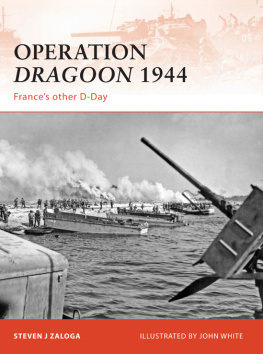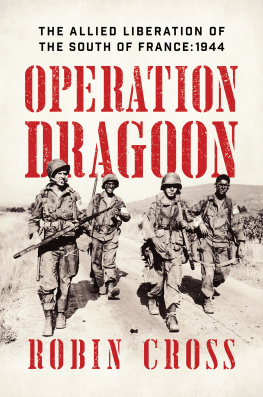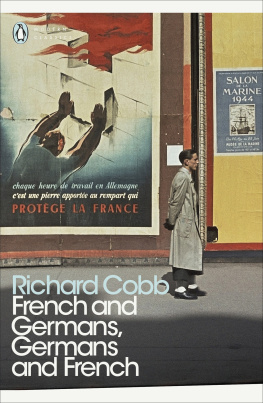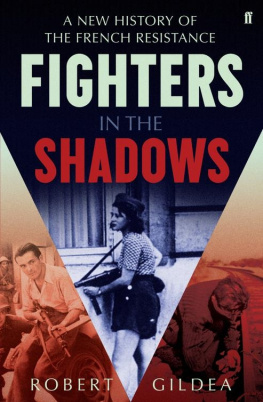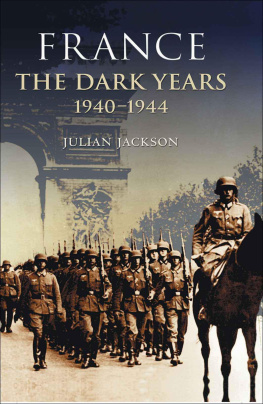In this text I have not included dialogue unless it comes from a source who I have reason to believe might have been present at the time or it has been noted down as dialogue in the course of taking testimony from a living witness.
Since this story concerns primarily military operations, I have used the twenty-four-hour clock throughout. In 1943 and 1944 all British forces in the European theatre used Greenwich Mean Time (GMT) plus one hour (UK Single Summer Time) from 16 August to 3 April, and GMT plus two hours from 4 April to 15 August (UK Double Summer Time). The time used in all German-occupied western European territories was Central European Time (CET), which in that era was UK Single Summer Time plus two hours. Since this story takes place primarily in France, all times in the text are given in, or adjusted to be consistent with, CET.
For a similar reason, units of measurement have been converted, where appropriate, to the metric scale.
Readers may want to know what the wartime franc was worth. Prices more than doubled during the four years of the German occupation of France, and inflation was very much worse on the black market. But one can get a rough idea of money values if one thinks of 1,000 francs in 19434 as the equivalent of 250 euros or 200 today.
Except where otherwise stated the translations of French source documents into English are those of the author. Where the original French was in a written formal document I have tried to make the translation as precise as possible. Where the original source is oral (for example, the oral evidence of witnesses) I have allowed myself greater latitude to cope with the differences in sentence formation between spoken French and English in an attempt to preserve the original sense and colour, while conveying this to the English reader in the most readable fashion.
The word maquis has subtly different meanings in English and French. The word originates from the Corsican term for the dry scrub which covers the hills of southern and Mediterranean France, but even more so from a Corsican expression prendre le maquis, which means to shelter in the woods to escape the authorities or a vendetta (to go underground). Even today, the word is used by the French primarily to describe those who resisted the Germans by going into the countryside and especially the wilder places. They formed into groups which sometimes took the name of the area they operated in for instance, le maquis du Vercors. The term maquisard in French denotes someone who belonged to a maquis cell, usually in a rural area. In French the term is not normally taken to apply to those who belonged to urban Resistance groups (for example, in Paris or Lyon). In modern English usage, however, the word Maquisard has become, for all practical purposes, synonymous with that of a Resistant, whether urban or rural. Since this is an English book the word Maquis is used in the English sense, except where it is plainly inappropriate to do so.
One of the problems with writing this book has been the storys high degree of complexity and detail. In an attempt not excessively to confuse the reader, I have tried to keep the personal names of those who played a minor role in the story out of the main text. For those interested, these, where known, are given in the Notes. Similarly, I have removed from the main text as many of the military unit names as possible; these too can be found in the Notes. And finally, in the same endeavour, I have submerged some of the myriad organizations involved in both London and Algiers. Thus the main directing French organization in London, the Bureau Central de Renseignements et dAction (BCRA), is referred to simply as London or de Gaulles headquarters in London, while the main Algiers organization for directing the Resistance in southern France, the Special Projects Operations Centre (SPOC), becomes just Algiers.
For the same reason and in the hope it will make them more accessible to the reader, I have tried to simplify the references by providing abbreviations for the main archives which I have consulted (such as TNA for the British National Archives at Kew, and NARA for the US National Archives and Records Administration). A key giving each of these abbreviations can be found at the start of the Notes section.
I first became fascinated by the wartime epic of the Vercors in the early 1970s when I worked in the United Kingdom Mission to the United Nations in Geneva. I was drawn to it because of the tragedy and the horror of the story. But also because it struck me as a powerful example of a subject that has always fascinated me: the consequences for those on the front lines of conflict when those at the top know too little about the harsh realities of war, or think too little about what their decisions mean on the ground.
This is a French story, of course. But it is also a very human epic which has lessons for us all. The strong are not always wise. The simple not always stupid. The weak do not always lose. In most cases, the final determiner of outcomes rests, not with machines, or might, or well-laid plans, but with how individuals behave at the moment of trial.
This story has another function too. In this, the year of the seventieth anniversary of D-Day, it is as well to remember that the Normandy invasion was about more than what happened on the Normandy beaches, most of which is minutely documented and recorded. This is the hidden story of D-Day, when thousands of ordinary, untrained and in most cases crudely armed French men and women put their lives at risk quite as much as those who stormed the beaches, because they were determined to help throw out a hated occupier and join the fight to liberate their country.
BENNES, Robert (BOB)
Zellers radio operator and commander of La Britire radio house.
BILLON, Francis (TARTANE)
Parachuted in with Tournissa. Injured. One of those shot at the Grotte de la Luire.
BLAIN, La
Cipher and coding assistant to Eucalyptus. Runner for Jean Prvost.
BLANC, Paul (JEAN-PAUL)
Commander of the Trives Maquis unit on the Pas de lAiguille.
BOIRON, Victor
Tractor driver in Vassieux.
BOISSIRE, Gustave (BOIS)
Speleologist and liaison officer to the Eucalyptus Mission.
BORDENAVE, Andr (DUFAU)
Commander of 6th BCA.
BOURDEAUX, Louis (FAYARD)
Commander of a Maquis company in Royans.
BOURGEOIS, Maurice (BATAILLE)
Maquis leader who accompanied Vernon Hoppers on the Lus-la-Croix-Haute ambush.
BOURGS-MAUNOURY, Maurice (POLYGONE)
Military delegate of R1, then National Military delegate.
BOUSQUET, Ren (CHABERT)
Huets deputy.
BUCKMASTER, Colonel Maurice
Head of SOEs F Section.
CAMMAERTS, Francis (ROGER)
SOE F Section Organizer of Jockey circuit.
CATHALA, Gaston (GRANGE)
Maquis leader in the west of the plateau.
CHAMBONNET, Albert (DIDIER)
Commander of the Secret Army in the Lyon area.
CHAMPETIER DE RIBES, Maude (DANIELLE)
Milice spy and mistress of Dagostini.
CHAVANT, Eugne (CLMENT)
(Le Patron) Political leader of the Vercors.
CONSTANS, Jean (SAINT-SAUVEUR)
Responsible for assistance to the Vercors in Algiers.
CONUS, Adrien (VOLUME)
Member of Eucalyptus Mission. Sent by Huet to get help from Bauges Maquis on 21 July.
COSTA DE BEAUREGARD, Roland (DURIEU)
Responsible for the northern sector of the Vercors.
COULANDON, mile (GASPARD)
Resistance leader on the Mont Mouchet.

